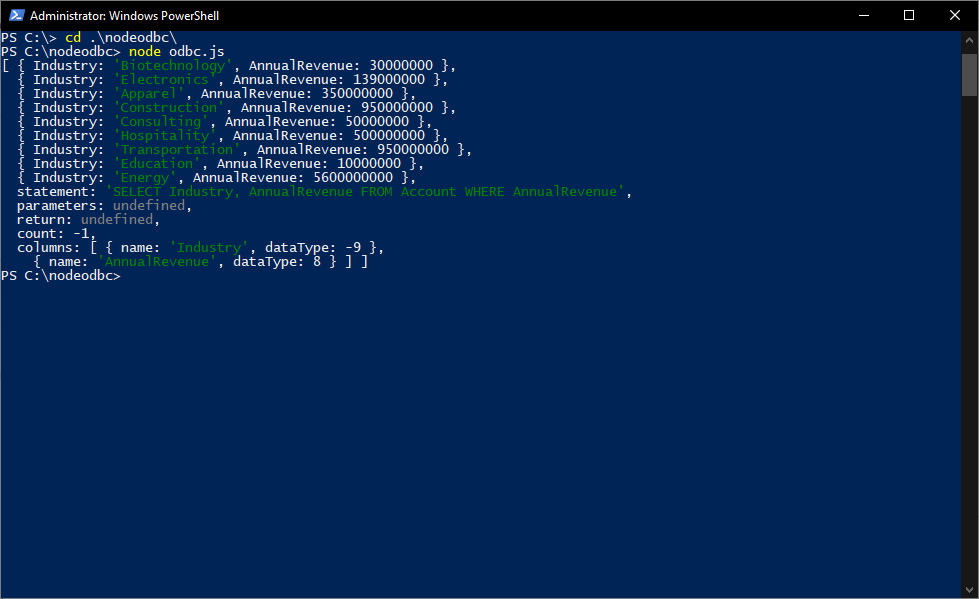Discover how a bimodal integration strategy can address the major data management challenges facing your organization today.
Get the Report →Query Okta Data through ODBC in Node.js
Use node-odbc to execute SQL queries against Okta data from Node.js.
Node.js is a JavaScript runtime environment that allows you to run JavaScript code outside of a browser. With the CData ODBC Driver for Okta, you can access live Okta data from Node.js apps and scripts. In this article, we walk through installing node-odbc and the required tools to create a simple Node.js app with access to live Okta data.
With built-in optimized data processing, the CData ODBC Driver offers unmatched performance for interacting with live Okta data in Node.js. When you issue complex SQL queries from Node.js to Okta, the driver pushes supported SQL operations, like filters and aggregations, directly to Okta and utilizes the embedded SQL engine to process unsupported operations client-side (often SQL functions and JOIN operations).
Connecting to Okta Data
If you have not already done so, provide values for the required connection properties in the data source name (DSN). You can use the built-in Microsoft ODBC Data Source Administrator to configure the DSN. This is also the last step of the driver installation. See the "Getting Started" chapter in the help documentation for a guide to using the Microsoft ODBC Data Source Administrator to create and configure a DSN.
To connect to Okta, set the Domain connection string property to your Okta domain.
You will use OAuth to authenticate with Okta, so you need to create a custom OAuth application.
Creating a Custom OAuth Application
From your Okta account:
- Sign in to your Okta developer edition organization with your administrator account.
- In the Admin Console, go to Applications > Applications.
- Click Create App Integration.
- For the Sign-in method, select OIDC - OpenID Connect.
- For Application type, choose Web Application.
- Enter a name for your custom application.
- Set the Grant Type to Authorization Code. If you want the token to be automatically refreshed, also check Refresh Token.
- Set the callback URL:
- For desktop applications and headless machines, use http://localhost:33333 or another port number of your choice. The URI you set here becomes the CallbackURL property.
- For web applications, set the callback URL to a trusted redirect URL. This URL is the web location the user returns to with the token that verifies that your application has been granted access.
- In the Assignments section, either select Limit access to selected groups and add a group, or skip group assignment for now.
- Save the OAuth application.
- The application's Client Id and Client Secret are displayed on the application's General tab. Record these for future use. You will use the Client Id to set the OAuthClientId and the Client Secret to set the OAuthClientSecret.
- Check the Assignments tab to confirm that all users who must access the application are assigned to the application.
- On the Okta API Scopes tab, select the scopes you wish to grant to the OAuth application. These scopes determine the data that the app has permission to read, so a scope for a particular view must be granted for the driver to have permission to query that view. To confirm the scopes required for each view, see the view-specific pages in Data Model < Views in the Help documentation.
Building node-odbc
In order to connect to Okta through the CData ODBC Driver, you need to build node-odbc manually (after installing the required tools).
Installing the Required Tools
The following commands install the tools required to build node-odbc (note the -g parameter, which installs the tools globally).
npm i -g windows-build-tools npm i -g node-gyp
Building node-odbc
After installing the required tools, create a directory for the Node.js app and install odbc (which builds the binary for us to use in our Node.js script).
mkdir nodeodbc cd nodeodbc npm i -g node
Querying Okta from Node.js
With the ODBC Driver installed, a DSN Configured, and node-odbc built, we are ready to query live Okta data from a Node.js app. The sample code below connects to a specific DSN and queries the Users table.
myscript.js
const odbc = require('odbc');
async function queryOkta() {
const connection = await odbc.connect(`DSN=CData Okta Source`);
const data = await connection.query('SELECT Id, ProfileFirstName FROM Users');
console.log(data);
}
queryOkta();
Once you write the app, use node to execute the script:
node myscript.js

Download a free, 30-day trial of the CData ODBC Driver for Okta and start working with your live Okta data in Node.js. Reach out to our Support Team if you have any questions.





